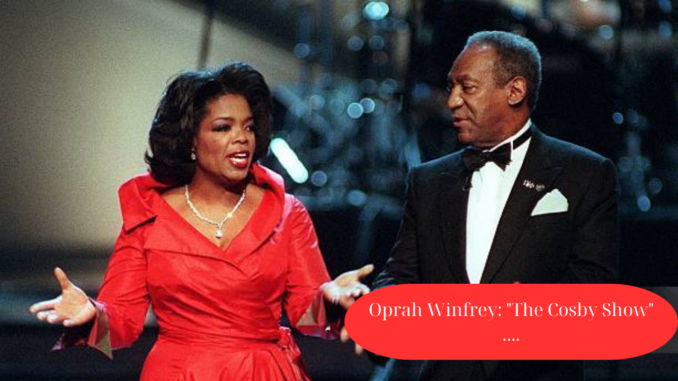
The Cosby Show has become a cultural icon, not just for the African-American community but for American television as a whole. Oprah Winfrey’s remark that “The Cosby Show” is a groundbreaking series that changed perceptions of African-American families on television not only reflects the show’s reality but also affirms its cultural power. This article explores the groundbreaking impact of The Cosby Show, as well as the significant influence it has left on television history and American cultural society.
The Cosby Show – A Groundbreaking Hit on Television
Television Context Before The Cosby Show
Before The Cosby Show debuted in 1984, most American television programs featured white families or portrayed African-American characters through stereotypes, often depicting them as impoverished or uneducated. Television in the 1970s and 1980s rarely presented a realistic and positive image of African-Americans. Shows like Sanford and Son and Good Times often portrayed black characters in a comedic light, living in economic hardship. This inadvertently reinforced negative stereotypes and lacked diversity in the representation of African-Americans on screen.
The Emergence of The Cosby Show
The Cosby Show marked a significant shift in this narrative. Created by Bill Cosby, the series revolves around the Huxtable family, an African-American middle-class family, with the father, Dr. Heathcliff Huxtable (played by Bill Cosby), and the mother, Clair Huxtable (Phylicia Rashad), a successful lawyer. The Huxtable family not only enjoys economic comfort but also embodies traditional family values, with respect and love among its members.
With The Cosby Show, American audiences saw an African-American family depicted as ordinary, loving, and successful, breaking away from previous stereotypes. This is what made the show unique and groundbreaking.
Why The Cosby Show Was a Breakthrough
Breaking Stereotypes on Screen
The Cosby Show completely changed how Americans viewed African-American families on television. Instead of focusing on poverty or struggle, the show introduced a successful, happy, and loving family. This provided a new perspective on African-Americans, free from negative stereotypes. The success of the Huxtable family expanded the audience’s view of diversity in American society.
One of the reasons The Cosby Show had such a powerful impact was its portrayal of universal values about family, education, and morality that every family, regardless of race or social status, could relate to. The show emphasized the importance of educating children, the value of love and family unity, and overcoming life’s challenges.
Changing American Television Culture
When The Cosby Show premiered, it radically transformed the American television industry. It was one of the most-watched shows at the time, not only among African-American audiences but also among white and other diverse viewers. The show proved that a program featuring African-American characters could attract a large and varied audience.
Thanks to The Cosby Show, television producers began to reconsider the role and representation of African-Americans on screen. Many subsequent programs dared to break barriers and offer more realistic and diverse portrayals of minority communities.
Oprah Winfrey and Her Praise for The Cosby Show
Personal Impact on Oprah Winfrey
Oprah Winfrey, one of the most influential figures in media, has always affirmed the importance of The Cosby Show. Throughout her career, Oprah has frequently mentioned The Cosby Show as a major source of inspiration. Not only was she a fan of the show, but she also deeply felt its impact on creating positive change in the perception of African-Americans.
In the 1980s and 1990s, Oprah faced many challenges as she began her career in television. The success of The Cosby Show helped create space for African-American figures like Oprah to shine, expanding opportunities for black creators and actors. Her remarks about the show are a testament to the pioneering role that The Cosby Show played in breaking down cultural barriers.
Impact on the African-American Community
Oprah has also emphasized that The Cosby Show not only changed television but also had a significant impact on American society. The show inspired pride among many African-Americans regarding their representation on screen. For many, the Huxtable family represented hope and aspiration for a better future.
Not only did The Cosby Show provide a positive image, but it also conveyed the importance of education, hard work, and family unity. These values are central to Oprah Winfrey’s own message in her programs and are part of why she values The Cosby Show so highly.
The Legacy of The Cosby Show
Paving the Way for Future Shows
The Cosby Show was not just a major commercial success but also a cultural phenomenon, paving the way for numerous subsequent television programs featuring black actors. Shows like Fresh Prince of Bel-Air, Family Matters, and Black-ish all drew inspiration from The Cosby Show and continued to advance the values that the program initiated.
The success of The Cosby Show also encouraged producers and directors to focus on telling authentic, inspiring stories about black communities, offering a more diverse perspective on American society.
A Lasting Cultural Legacy
As Oprah Winfrey has asserted, The Cosby Show did more than change television; it created a shift in societal perceptions of African-Americans. The show opened a new chapter in television where diversity and cultural representation became increasingly important.
Although The Cosby Show later faced controversy due to allegations against Bill Cosby, the show’s legacy remains one of the most significant milestones in television history. The Cosby Show was not just a source of entertainment but a symbol of change and cultural progress, particularly for the African-American community.